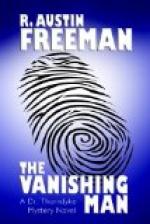“The questions, then, gentlemen, that you have to ask yourselves before deciding on your verdict are two: first, Are the circumstances of the testator’s disappearance and his continued absence incongruous with his habits and personal peculiarities as they are known to you? and second, Are there any facts which indicate in a positive manner that the testator is dead? Ask yourselves these questions, gentlemen, and the answers to them, furnished by the evidence that you have heard, will guide you to your decision.”
Having delivered himself of the above instructions, the judge applied himself to the perusal of the will with professional gusto, in which occupation he was presently disturbed by the announcement of the foreman of the jury that a verdict had been agreed upon.
The judge sat up and glanced at the jury-box, and when the foreman proceeded to state that “We find no sufficient reason for presuming the testator, John Bellingham, to be dead,” he nodded approvingly. Evidently that was his opinion, too, as he was careful to explain when he conveyed to Mr. Loram the refusal of the Court to grant the permission applied for.
The decision was a great relief to me, and also, I think, to Miss Bellingham; but most of all to her father, who, with instinctive good manners, since he could not suppress a smile of triumph, rose hastily and stumped out of the Court, so that the discomfited Hurst should not see him. His daughter and I followed, and as we left the Court she remarked, with a smile:
“So our pauperism is not, after all, made absolute. There is still a chance for us in the Chapter of Accidents—and perhaps even for poor old Uncle John.”
CHAPTER XV
CIRCUMSTANTIAL EVIDENCE
The morning after the hearing saw me setting forth on my round in more than usually good spirits. The round itself was but a short one, for my list contained only a couple of “chronics,” and this, perhaps, contributed to my cheerful outlook on life. But there were other reasons. The decision of the Court had come as an unexpected reprieve and the ruin of my friends’ prospects was at least postponed. Then, I had learned that Thorndyke was back from Bristol and wished me to look in on him; and, finally, Miss Bellingham had agreed to spend this very afternoon with me, browsing round the galleries at the British Museum.
I had disposed of my two patients by a quarter to eleven, and three minutes later was striding down Mitre Court, all agog to hear what Thorndyke had to say with reference to my notes on the inquest. The “oak” was open when I arrived at his chambers, and a modest flourish on the little brass knocker of the inner door was answered by my quondam teacher himself.




